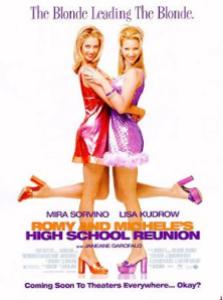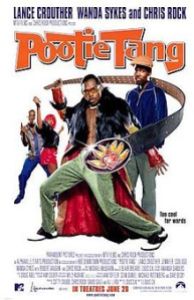Romy and Michele’s High School Reunion (1997)
Embarrassed with the current state of their lives, Romy (Mira Sorvino) and Michelle (Lisa Kudrow) create a fictional backstory as successful business women when they attend their ten-year high school reunion.
I’ve loved Mira Sorvino since Mighty Aphrodite (1995), but Lisa Kudrow has never been able to convince me she’s anybody but Phoebe Buffay.
Alan Cumming is excellent Sandy Frink, the super successful nerd from high school, and Janeane Garafalo is well suited as fellow outcast Heather Mooney.
The director, David Mirkin, served as show runner for Newhart, created the cult sitcom Get a Life, and was an executive producer on The Simpsons. His surreal sense of humor and penchant for romanticized outcasts are major themes in this movie.
This quirky celebration of doing what you love and not allowing outsiders to dictate how you perceive yourself started off fresh and interesting, but the ending was pedestrian. The movie’s message can be diluted as “high school is a difficult experience.” There are tons of better movies which say the same thing.
Pootie Tang (2001)
Directed and later disowned by Louis CK, this silly film subverts the blaxploitation films of the 1970s to offer insightful commentary on race relations in America.
Lance Crouther has been a writer for Chris Rock, George Lopez, Bob Costas, and Bill Maher, but he’s convincing in this rare foray in front of the camera as the inexplicably charismatic Pootie.
One of American’s most popular comedians, Chris Rock, is very good in this movie, but he, too, disowned it.
J.B. Smoove and Wanda Sykes saved their best work for Curb Your Enthusiasm, but they’re effective here.
As a fan of The Wire, it was a treat to see J.D. Williams (Bodie), and Reg Cathey (Norm Wilson). Cathey usually plays more serious roles, but he gets “dirty” for comedy here.
Bob Costas shows incredible self-awareness in his brief cameo.
Since this film, Louis CK has established himself as an important comedic voice with his eponymous show and recent roles in movies by Woody Allen and David O. Russell. His burgeoning genius is evident here, despite his contention the film was edited beyond recognition without his permission.
Box Car Blues (1930)
In this Bosko short, he takes his crazy musical show on a train.
Some early Looney Tunes hold up better than others, but all of them seem to be elaborate excuses to show music visually, as if the creators were so enamored with their ability to combine sound and music they wanted to push it as far as possible.
Big Man from the North (1931)
At this point, the Looney Tunes shorts finally started to get away from the visual music motif and flesh out Bosko as a character. There’s still a good bit of music, but less than previous shorts in the series.
By this point, the producers had softened the edges of Bosko to de-emphasize his racial origin and this short featuring him as a Mountie assigned to capture a notorious peg-legged villain is good, silly fun.

